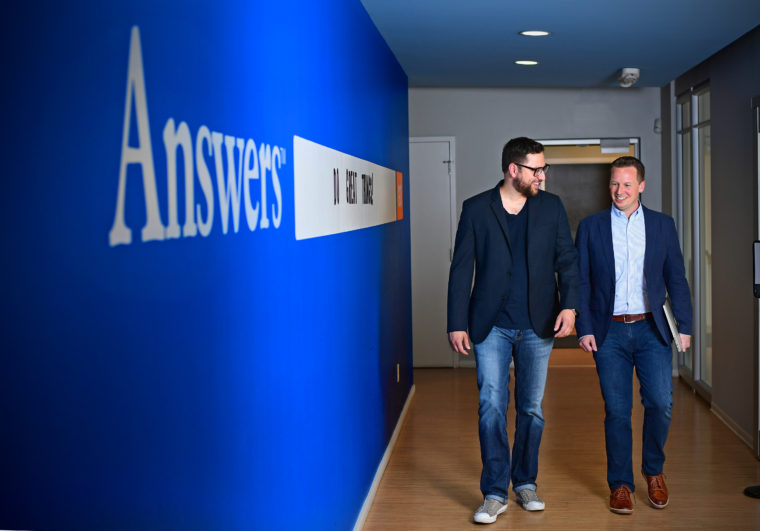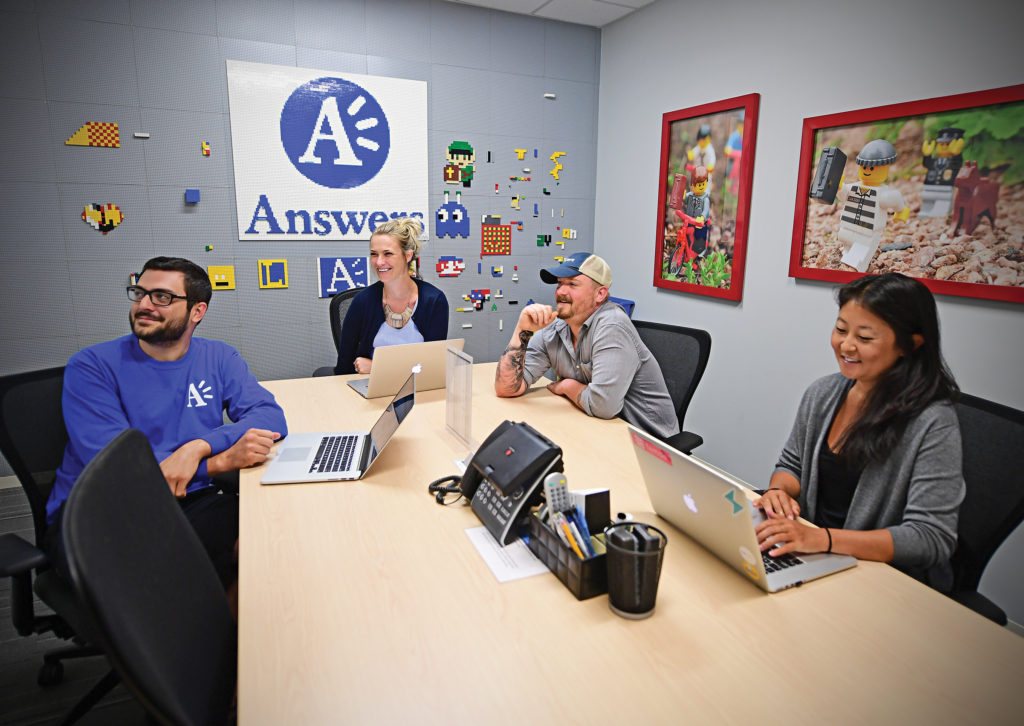David Karandish and Chris Sims met in high school in St. Charles County, Missouri. At Washington University, they both majored in computer science and minored in entrepreneurship.
Graduating in 2005, they soon founded the tech giant now known as Answers, which was acquired by a private equity company in 2014 for around $900 million.
Karandish is a former Mensa member who starred in The Apprentice. He and Sims are celebrated for building one of the most innovative, diversified companies currently running. But you won’t find them hobnobbing with the elite at fancy Silicon Valley parties. Around lunchtime, you’re more likely to find Karandish walking through The Loop, seemingly in a trance with his laptop open, on his way back from Zippy Burger.
That’s where I encountered him shortly before our meeting at Answers’ headquarters on Delmar Blvd., just upstairs from Seoul Taco and Club Fitness. Answers Corp. employs about 550 people around the world — from Mountain View, California, to Tel Aviv — but home base is University City, Missouri. Their offices have the feel of a startup, with an image of a gorilla pumping his fist at the end of a hallway and the Wi-Fi password written on a whiteboard wall in a conference room. There’s also an office Segway, a ping-pong table and a room full of Legos.
“I love St. Louis,” says Karandish, who serves as Answers’ CEO. “I think it’s underrated in many respects. The talent pool here is phenomenal. You don’t have the competitive situation of Silicon Valley or New York, where people hop from company to company all the time.”
The average Internet user is probably familiar with Answers.com as a question-and-answer site, at which users pose queries like, “Why are fries called French fries?” and someone else answers. (Because “a long thin cut is called a ‘French cut,’” it turns out.) But the company goes much, much deeper than that, generating about half its revenue from advertising and about half from something called Software as a Service (or SaaS). This involves selling brands’ “advanced content” to websites of major retailers.
“For Hasbro, we have a 360 demonstration for Mr. Potato Head, where you can put the nose on him, and the ears, and spin him around,” explains Karandish, adding that the content appears on the sites of companies selling toys.

Answers is also a leader in the realm of customer satisfaction surveys, compiling feedback to help companies, including Bass Pro Shops, Disney Stores and Victoria’s Secret, improve their customer experience. Shoppers can vent if they feel a site loads too slowly, or if the selection is too small, for example.
Answers employs a dizzying array of algorithms, metrics and Web technologies to accomplish these tasks, but everything stems from Karandish and Sims’ vision of helping customers make better decisions and helping companies understand what customers want. It’s sparked by strong chemistry between the co-founders. “We rarely ever argue with each other,” says Sims, the company’s genial, accessible chief strategy officer. They regularly logged 100-hour workweeks when they first went into business together, and they still maintain a remarkable work ethic.
“They’ve always had a great sense of trust with each other.”
— Professor Bart Hamilton
“They’ve always had a great sense of trust with each other,” says their former entrepreneurship professor, Bart Hamilton, the Robert Brookings Smith Distinguished Professor of Entrepreneurship at Olin Business School. “It was almost as if they were one person back then. That’s really unusual to see, especially at that young age.”
As teenagers, they bonded in physics class at Francis Howell Central High School in St. Charles over their love of coding. Karandish was working on a social media program that was something like a Facebook predecessor, while Sims was immersed in low-tech computer games. “I was into text-based bulletin-board video games — like Legend of the Red Dragon,” he says. “David liked to make fun of me.”
They started their first company during this time, building Web pages. “In the late ’90s, if you could build a Web page for someone, you were somewhere between a wizard and a warlock in terms of your magical powers,” Karandish says. Other early enterprises included an online fashion blog and a plug-in for AOL Instant Messenger, which converted typed text into spoken speech.
In college, they were roommates, living in a “roach-y” apartment north of The Loop and then in a house in Maplewood. “It was something like a frat house, except with no beer and no women,” Sims quips. Instead, they spent almost all their free time working. Their internships with MonsterCommerce — which specialized in SaaS and built shopping-cart software — led to jobs there, with the guys working six to eight hours per day, even beyond their demanding college course work. They spun off a “comparison-shopping–engine” business, to aid consumers in finding the best buys for thousands of items, and also developed a financial “lead-generation company” to help, say, people who wanted to refinance their houses get the best rates. The latter company was generating a half million dollars in revenue when they sold it. Keep in mind, they were still in college.
“I think I learned more from them than they learned from me, to be honest!” Professor Hamilton says with a laugh when asked about the skills the two students acquired in his entrepreneurship class. Still, Karandish gives a lot of credit to his time at Washington University. “It was good to learn how to buy a company, how to capitalize a company, those sorts of things,” he says. “College is a playground for experiential learning in the real world.” Indeed, Washington University boasts a long list of successful startups that were founded on campus through school programs, including Varsity Tutors (Karandish and Sims led Series A round for Varsity Tutors), Cofactor Genomics, Fresh Prints and Epharmix.
Owing to their great ambition, Karandish’s and Sims’ careers were already in motion well before graduation. In fact, in early 2005 after finishing his previous semester finals, Karandish hopped on a plane to New York to star in The Apprentice, the season it was hosted by Martha Stewart. Though he was cut in week six (“Martha Deletes Computer Geek” read the TVGuide.com headline), he enjoyed the experience, and the following year he and Sims kicked off the company that would become their legacy.
They dreamed big, envisioning creating what they called “the ultimate Internet company,” a goal that sounds almost naïve in an era of hyper-specialization in the tech sector. But they didn’t see it that way. “I think the Internet then, even today, is in its infancy, so there’s an opportunity to stake out some land,” Karandish says.
Originally called AFCV Holdings, their company was founded with the help of investor Tom Hillman, AB ’78, a university trustee who also served as a mentor to them. It was a conglomeration of many separate Internet businesses, offering information in areas such as health, travel and neighborhood services. Competing with sites like Yelp and Angie’s List, their pages were search-engine optimized so that when you searched for, say, the best plumber in your area, theirs popped up.
But Google began encroaching on their territory, and the two decided they needed to “produce their own content,” Karandish says. Realizing the popularity of the question-and-answer format, in 2011 they purchased Answers.com for $127 million. The site — originally an Internet Explorer plugin that allowed you to find out a word’s definition by right clicking on it — had become a Web-based Q&A enterprise with a huge user base, which Karandish and Sims quickly tapped into.
Since then, Answers.com’s readership and engagement has increased by leaps and bounds, and Answers Corp. has acquired numerous other organizations. In 2015, Forbes ranked it the 11th most promising company in the country. Their annual revenue is north of $200 million.
On the day I visited Answers’ offices, Sims had walked to work and Karandish had driven his Tesla. But the pair remain as close as ever. They both live in Clayton with their growing broods: Karandish has three children, and Sims two. “St. Louis is a great place to start a family,” says Karandish, adding that they have also remained connected to their alma mater, taking on students as interns and hiring alumni employees.
Reflecting on their longtime working relationship, Sims concludes, “David’s a great CEO. I’d be happy to work for him the rest of my life.”
— Ben Westhoff, AB ’99, author of The Untold Story of Dr. Dre, Eazy-E, Ice Cube, Tupac Shakur, and the Birth of West Coast Rap, is a freelance writer based in St. Louis.


